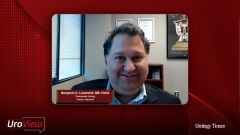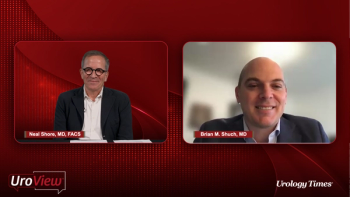
Collaborative approaches to treating advanced prostate cancer
The role of urologists in working with medical oncologists to treat patients with advanced prostate cancer, with special considerations for early referral.
Episodes in this series

Benjamin H. Lowentritt, MD, FACS: Hello and welcome to the UroView™ video series titled, “The Role of Androgen Receptor Inhibitors in the Management of Advanced Prostate Cancer.” I’m Ben Lowentritt, director of the comprehensive prostate cancer program at Chesapeake Urology Associates in Towson, Maryland. Joining me is my colleague, Dr Julie Graff, an associate professor of medicine at Knight Cancer Institute at Oregon Health & Science University in Portland, Oregon.
In today’s discussion, we’ll discuss the treatment of advanced prostate cancer and the role of androgen receptor inhibitors as a treatment option for metastatic castration-sensitive prostate cancer and nonmetastatic castration-resistant prostate cancer.
Let’s get started. Julie, it’s good to see you. How are you doing?
Julie N. Graff, MD: Nice to see you, Ben. Thank you.
Benjamin H. Lowentritt, MD, FACS: One of the questions that always comes up is, what is the role of the urologist when a patient has advanced prostate cancer, both in the nonmetastatic CRPC [castration-resistant prostate cancer] space and the metastatic castration-sensitive prostate cancer space? As a urologist, if a urologist is interested enough, we have the expertise and experience with most of the agents that are hormone-mediated to diagnose these patients and then treat them through a lot of the stages of this disease. But more than anything, you must have the interest and take the effort to stay up with what is a quickly evolving and emerging science that’s coming out in this. So even if you’re not going to be treating it yourself, you’re at least recognizing when you need to refer a patient to someone who’s taking care of it.
What’s your practice like in your area? How do you get these patients? What do you see as the role of the urologist?
Julie N. Graff, MD: Thanks for asking that, Ben. At my institution, urologists pretty much give their patients over to medical oncology if they have metastatic disease or they become castration-resistant with biochemical relapse. Sometimes we even get them earlier because they’ll be receiving hormonal therapy with their radiation or after surgery. In the academic setting, there’s a strong desire to get patients over to medical oncology, probably more so than in private practice where it matters that you have these patients because they can be billable, etc. In academic medicine, people are on a flat salary.
The medical oncologist plays an important role. Of course, I’m biased. But I did a 3-year internal medicine residency and I know about diabetes, heart disease—things that I’m sure surgeons know about but may not deal with from day to day. We’ll go through these agents, but some of them have potential adverse effects that need to be managed in real time.
Benjamin H. Lowentritt, MD, FACS: That’s a great point. Anyone who’s choosing to focus on this should be aware and in constant communication with the medical team and the patient themselves to make them aware of the potential risks. With all of cancer exploding, your institution is fortunate to have you specializing in this. We sometimes struggle in the community in finding medical oncologists who are as up to date and as engaged with our patients. There’s a lot of give and take there. There’s understanding when the appropriate time is to hand off, or maybe how to work more in concert. That’s always evolving in these types of care. Our practice pattern for years was that hormonal therapies were always given by the urologist. Even when I was training, I was trained in that. But as those treatments became more complex, you had to focus on it more to really stay up on it.
Is there anything out of the NCCN [National Comprehensive Cancer Network] guidelines that steers this discussion one way or the other?
Julie N. Graff, MD: Focusing on the guidelines, it’s hard for me to say. When we use chemotherapy, it’s pretty obvious that the patients should come to medical oncology. Some urology practices were able to offer chemotherapy, but at that time, it was very medical oncology–focused. In terms of the guidelines, a urologist who’s well trained and up to date in all the medications could treat a patient until they need chemotherapy. It’s just a question of whether you want to. You also bring up an excellent point, which is that medical oncology is changing so rapidly that unless you focus in 1 area, it’s easy to miss out on developments. I don’t know how the general oncologist does it anymore.
Benjamin H. Lowentritt, MD, FACS: Yes. We hear that from our colleagues all the time. When you have a really good relationship, you can develop that more collaborative approach, and that’s always the best thing for the patient. That’s great. Thank you.
Transcript edited for clarity.
Newsletter
Stay current with the latest urology news and practice-changing insights — sign up now for the essential updates every urologist needs.







